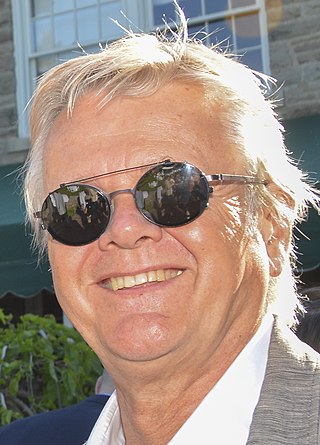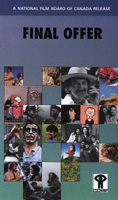
The National Film Board of Canada is Canada's public film and digital media producer and distributor. An agency of the Government of Canada, the NFB produces and distributes documentary films, animation, web documentaries, and alternative dramas. In total, the NFB has produced over 13,000 productions since its inception, which have won over 5,000 awards. The NFB reports to the Parliament of Canada through the Minister of Canadian Heritage. It has bilingual production programs and branches in English and French, including multicultural-related documentaries.

The history of cinema in Quebec started on June 27, 1896 when the Frenchman Louis Minier inaugurated the first movie projection in North America in a Montreal theatre room. However, it would have to wait until the 1960s before a genuine Quebec cinema industry would emerge. Approximately 620 feature-length films have been produced, or partially produced by the Quebec film industry since 1943.
Roman Kroitor was a Canadian filmmaker who was known as a pioneer of Cinéma vérité, as the co-founder of IMAX, and as the creator of the Sandde hand-drawn stereoscopic 3D animation system. He was also the original inspiration for The Force. His prodigious output garnered numerous awards, including two BAFTA Awards, three Cannes Film Festival awards, and two Oscar nominations.
Universe is a 1960 black-and-white animated documentary short film made in 1960 by Roman Kroitor and Colin Low for the National Film Board of Canada, which says that the film "creates on the screen a vast, awe-inspiring picture of the universe as it would appear to a voyager through space. Realistic animation takes you into far regions of space, beyond the reach of the strongest telescope, past Moon, Sun, and Milky Way into galaxies yet unfathomed."
Cynthia Scott is a Canadian award-winning filmmaker who has produced, directed, written, and edited several films with the National Film Board of Canada (NFB). Her works have won the Oscar and Canadian Film Award. Scott is a member of the Royal Canadian Academy of Arts. Her projects with the NFB are mainly focused on documentary filmmaking. Some of Scott's most notable documentaries for the NFB feature dancing and the dance world including Flamenco at 5:15 (1983), which won an Academy Award for Best Documentary at the 56th Academy Awards in 1984. She is married to filmmaker John N. Smith.

If You Love This Planet is a 1982 Canadian documentary short film directed by Terre Nash. Produced by Studio D and distributed by the National Film Board of Canada.

Sturla Gunnarsson is an Icelandic-Canadian film and television director and producer.

Final Offer is a Canadian film documenting the 1984 contract negotiations between the United Auto Workers Union (UAW) and GM. Ultimately, it provided a historical record of the birth of the Canadian Auto Workers Union (CAW) as Bob White, the head of the Canadian sector of the UAW, led his membership out of the International Union and created the CAW.

Docufiction is the cinematographic combination of documentary and fiction, this term often meaning narrative film. It is a film genre which attempts to capture reality such as it is and which simultaneously introduces unreal elements or fictional situations in narrative in order to strengthen the representation of reality using some kind of artistic expression.
Flamenco at 5:15 is a 1983 short documentary film directed by Cynthia Scott, taking audiences inside a flamenco dance class at the National Ballet School of Canada. Produced by Studio D, the women's studio of the National Film Board of Canada, the film won an Oscar at the 56th Academy Awards in 1984 for Documentary Short Subject.
Going the Distance is a 1979 Canadian documentary film directed by Paul Cowan about the 1978 Commonwealth Games. Produced by the National Film Board of Canada, and produced by Robert Verrall and Jacques Bobet, it was nominated for an Academy Award for Best Documentary Feature.

Pour la suite du monde is a 1963 Canadian documentary film produced by the National Film Board of Canada and directed by Michel Brault, Marcel Carrière and Pierre Perrault. It is the first of Perrault's Isle-aux-Coudres Trilogy–Le règne du jour followed in 1967, Les voitures d'eau in 1968.
Nick Hector is a British Canadian film producer and editor, and professor of film production at the University of Windsor.
Candid Eye is a Canadian documentary television series which aired on CBC Television in 1958 and was expanded into 1961.
Sad Song of Yellow Skin is a 1970 direct cinema-style documentary, produced by the National Film Board of Canada, on the effects of the Vietnam War on street children in Saigon.
John Kemeny was a Hungarian-Canadian film producer whom the Toronto Star called "the forgotten giant of Canadian film history and...the most successful producer in Canadian history." His production credits include The Apprenticeship of Duddy Kravitz, Atlantic City, and Quest for Fire.

Monsoon is a 2014 Canadian documentary film by Sturla Gunnarsson about the monsoon weather system in India.
Derek May (1932–1992) was a Canadian animation, dramatic and documentary film director who worked primarily for the National Film Board of Canada (NFB). Originally a painter, his first film with the NFB was the 1966 experimental short, Angel. His documentary work often focused on the role of the artist in society. His other credits include collaborating the Donald Brittain on the narration for Helicopter Canada.
The Masculine Mystique is a Canadian docufiction film directed by Giles Walker and John N. Smith and released in 1984.








